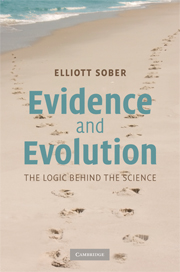2 - Intelligent design
Published online by Cambridge University Press: 05 June 2012
Summary
DARWIN AND INTELLIGENT DESIGN
The first edition of Darwin's On the Origin of Species by Means of Natural Selection, or the Preservation of Favoured Races in the Struggle for Life (1859) begins with quotations from two philosophers:
But with regard to the material world, we can at least go so far as this – we can perceive that events are brought about not by insulated interpositions of Divine power, exerted in each particular case, but by the establishment of general laws.
(W. Whewell, Bridgewater Treatise)To conclude, therefore, let no man out of a weak conceit of sobriety, or an ill-spirited moderation, think or maintain, that a man can search too far or be too well studied in the book of God's word, or in the book of God's works; divinity or philosophy; but rather let men endeavour an endless progress or proficience in both.
(F. Bacon, Advancement of Learning)William Whewell was Darwin's contemporary and rejected his theory of evolution, a result that Darwin probably anticipated when he wrote The Origin of Species. Francis Bacon wrote more than 200 years earlier. The two quotations are interesting because of what they reveal about Darwin's views on the relationship of belief in God and belief in evolution.
Bacon's remark harks back to an old distinction between the Bible (God's word) and nature (God's work). Sacred texts and natural phenomena provide separate pathways for learning about God.
- Type
- Chapter
- Information
- Evidence and EvolutionThe Logic Behind the Science, pp. 109 - 188Publisher: Cambridge University PressPrint publication year: 2008



